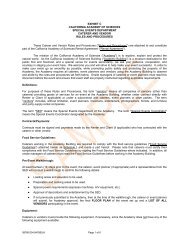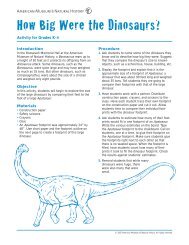Annual Report 2008 - California Academy of Sciences
Annual Report 2008 - California Academy of Sciences
Annual Report 2008 - California Academy of Sciences
Create successful ePaper yourself
Turn your PDF publications into a flip-book with our unique Google optimized e-Paper software.
<strong>of</strong> science and sustainability.<br />
Participants will receive an annual<br />
stipend and free membership to<br />
the <strong>Academy</strong> and can earn three<br />
graduate-level credits per year from<br />
San Francisco State University.<br />
The new Teachers’ Website<br />
makes a wide range <strong>of</strong> science<br />
resources easily accessible.<br />
Teachers can view tips for planning<br />
the perfect field trip, search a<br />
database <strong>of</strong> <strong>Academy</strong>-designed<br />
activities related to the new<br />
museum, download lesson plans,<br />
and keep up with their colleagues<br />
on the Teachers’ Lounge blog.<br />
The <strong>Academy</strong> goes to the<br />
classroom, as well. Teachers<br />
can arrange to borrow <strong>Academy</strong><br />
Classroom Kits—portable<br />
containers packed with numerous<br />
classroom activities, games,<br />
specimens, books, and DVDs. All kits<br />
address <strong>California</strong> Science Content<br />
Standards and can accommodate<br />
classes <strong>of</strong> up to 30 students. The<br />
Naturalist Center provides a lending<br />
library on a number <strong>of</strong> biodiversity<br />
and environmental topics as well.<br />
Education resources for the public<br />
The <strong>Academy</strong>’s educational<br />
opportunities aren’t just for<br />
students and teachers. Every<br />
visitor has the chance to explore,<br />
experience, and gain a deeper<br />
understanding <strong>of</strong> the natural world.<br />
The <strong>Academy</strong>’s exhibits provide<br />
an in-depth look at the most<br />
important scientific issues facing<br />
the planet. For example, the new<br />
exhibit Altered State: Climate Change<br />
in <strong>California</strong> uses <strong>California</strong> as a<br />
case study to explore the science<br />
<strong>of</strong> climate change, the effects we<br />
might expect to see in our own<br />
backyard, and the steps that can be<br />
taken to mitigate these dramatic<br />
changes.<br />
In Islands <strong>of</strong> Evolution, visitors<br />
can gaze upon real specimens <strong>of</strong><br />
Galápagos tortoises and lemur<br />
skeletons from Madagascar.<br />
Children can play the role <strong>of</strong> a<br />
scientist as they try their hands<br />
at capturing virtual insects with<br />
interactive games. And in the<br />
newly refurbished African Hall,<br />
favorite dioramas sit next to living<br />
chameleons and penguins to<br />
create new fond memories and<br />
inspire a new generation <strong>of</strong><br />
<strong>Academy</strong> visitors.<br />
The Naturalist Center <strong>of</strong>fers a<br />
welcoming environment to anyone<br />
interested in learning more about<br />
the natural world and sustainability.<br />
A biodiversity and environmental<br />
resource center, the Naturalist<br />
Center provides specimens, books,<br />
videos, hands-on activities, and<br />
trained <strong>Academy</strong> experts. Visitors<br />
can join a lively discussion about<br />
a science-themed book, ask an<br />
<strong>Academy</strong> expert to help identify<br />
a mysterious feather from their<br />
backyard, or even go on a scavenger<br />
hunt through the museum.<br />
Learning opportunities at the<br />
<strong>Academy</strong> change daily, with<br />
scheduled events ranging from<br />
penguin feedings to planetarium<br />
shows to film presentations.<br />
The Science in Action exhibit<br />
takes visitors inside the day’s<br />
headlines to gain a deeper understanding<br />
<strong>of</strong> recent scientific<br />
discoveries around the world. Live<br />
talks by <strong>Academy</strong> scientists, audio-<br />
visual displays, computer stations,<br />
and online podcasts provide a reliable<br />
source <strong>of</strong> timely and relevant news<br />
about the natural world.<br />
Of course, one <strong>of</strong> the most<br />
effective ways to learn about<br />
science is to become an <strong>Academy</strong><br />
volunteer. Participants in the Docent<br />
and <strong>Academy</strong> Guide program<br />
receive extensive training in both<br />
scientific content and best practices<br />
<strong>of</strong> engaging diverse visitors <strong>of</strong> all<br />
ages. They are then qualified to<br />
provide hands-on interactions,<br />
staff live animal demonstrations,<br />
lead behind-the-scenes tours,<br />
help children and their caregivers<br />
learn about science, and provide<br />
invaluable assistance throughout<br />
the <strong>Academy</strong>.<br />
Looking forward<br />
The <strong>Academy</strong> is committed to<br />
providing the entire community<br />
with a truly unique way to<br />
learn. Its programs, workshops,<br />
opportunities, and resources are<br />
developed to enthrall and enlighten,<br />
and to create a lifelong commitment<br />
to protecting the natural world.<br />
As science continues to<br />
evolve, so too will the <strong>Academy</strong>’s<br />
educational programs, ensuring that<br />
this vital public source for scientific<br />
knowledge is always relevant,<br />
useful, and inspirational.<br />
Above left: Teachers visit the underwater<br />
rainforest tunnel in the <strong>Academy</strong>’s Flooded<br />
Amazon exhibit. Above right: A docent<br />
with students at the Discovery Tidepool.<br />
In interactive exhibits like this one, the<br />
<strong>Academy</strong>’s docents and guides play a<br />
crucial role, passing knowledge directly to<br />
visitors through one-on-one encounters.<br />
Inspiring passion for science<br />
in teachers and students<br />
Teacher Services Enhanced Museum Visits<br />
for Students<br />
The natural world is changing,<br />
and teachers are eager to stay<br />
ahead <strong>of</strong> the curve. The <strong>Academy</strong><br />
provides pr<strong>of</strong>essional development<br />
opportunities through classes and<br />
workshops on science-related<br />
topics ranging from sustainability to<br />
collecting ants in the schoolyard.<br />
Teachers can access the <strong>Academy</strong><br />
24/7 through their own website,<br />
which includes online resources,<br />
downloadable lesson plans, and<br />
student worksheets that make<br />
classroom curricula engaging<br />
and fun. The <strong>Academy</strong> remains<br />
committed to providing resources<br />
that enable teachers to continually<br />
inspire themselves and their<br />
students.<br />
Mira Sinick, 3rd grade teacher at Lawton<br />
Elementary School, is enrolled in the Teacher<br />
Institute on Science and Sustainability.<br />
She wants to learn about recycling versus<br />
reusability.<br />
Whether taking a virtual tour <strong>of</strong><br />
the Solar System or viewing insects<br />
through a compound microscope,<br />
a customized field trip experience<br />
enables students to learn like never<br />
before. With a generous grant<br />
from the Arthur and Toni Rembe<br />
Rock Fund, this program provides<br />
San Francisco 4th and 5th grade<br />
students with complimentary<br />
transportation and a “green” boxed<br />
lunch. Limited edition T-shirts<br />
provide free admission to the<br />
<strong>Academy</strong> for the rest <strong>of</strong> the year,<br />
fostering a new generation <strong>of</strong><br />
junior scientists.<br />
As a 5th grade student at Claire Lilienthal<br />
School, Chelsea Nguyen loves to study<br />
animals, water, and the sun. Her favorite<br />
part <strong>of</strong> the new <strong>Academy</strong> is the Morrison<br />
Planetarium.<br />
Answering many questions,<br />
fostering more curiosity<br />
Docents, Guides,<br />
and Volunteers<br />
Over 700 highly trained docents<br />
and 1000 volunteers, ranging in age<br />
from 18 to 93, play a vital role in<br />
<strong>Academy</strong> operations and the visitor<br />
experience. Easy to find in their<br />
bright orange lab coats, docents<br />
and guides lead tours, interpret<br />
exhibits on the public floor, and<br />
inspire visitors. Behind the scenes,<br />
volunteers work with staff and<br />
scientists to care for live animals,<br />
provide horticulture assistance<br />
on the ro<strong>of</strong>, and maintain the<br />
scientific collections by mounting<br />
plants, pinning insects, and bottling<br />
specimens.<br />
For over seven years, Henri Lese has<br />
enthusiastically served as an <strong>Academy</strong><br />
Docent on the public floor. He loves having<br />
animated conversations with visitors <strong>of</strong> all<br />
ages and experiencing their “aha!” moments.<br />
Naturalist Center Staff<br />
From identifying specimens to<br />
helping students complete research<br />
projects, Naturalist Center staff<br />
members serve as a bridge between<br />
visitors and the <strong>Academy</strong>’s experts.<br />
They’re passionate about answering<br />
curious visitors’ questions about<br />
the natural world and can even<br />
help identify that mysterious rock<br />
from the backyard. Staff members<br />
provide guidance through books,<br />
computers, microscopes, and<br />
consultations with scientists.<br />
They host monthly and weekly<br />
activities, including sciencethemed<br />
storytimes and sing-alongs<br />
for children, mystery boxes <strong>of</strong><br />
specimens, and scavenger hunts.<br />
As a Naturalist Center Co-Manager and<br />
its Senior Educator, Roberta Ayres knows<br />
the <strong>Academy</strong> inside and out. She loves<br />
answering questions about exhibits<br />
and the natural world.<br />
21


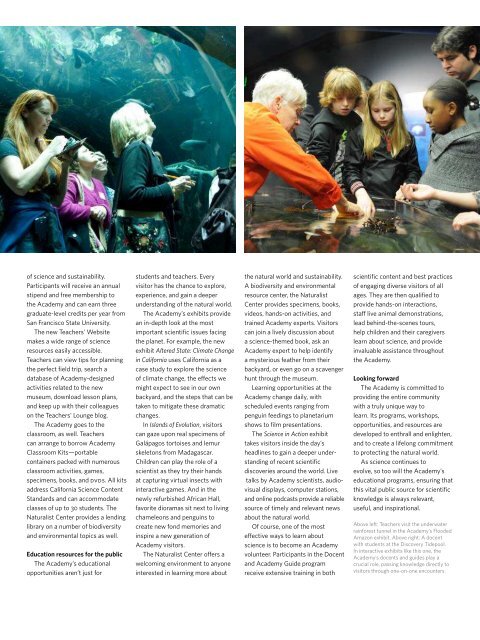
![download [PDF - 2.7mb] - California Academy of Sciences](https://img.yumpu.com/26596748/1/190x122/download-pdf-27mb-california-academy-of-sciences.jpg?quality=85)

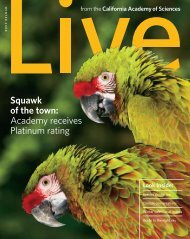
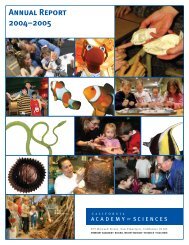
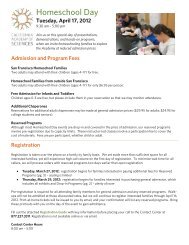
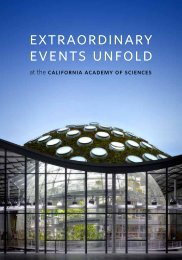
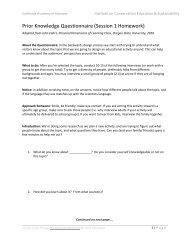
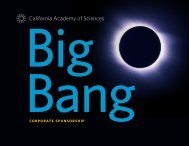
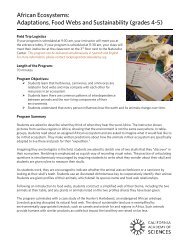
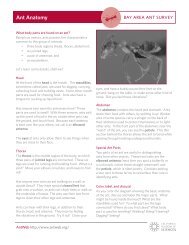
![Download a visitor map [418k] - California Academy of Sciences](https://img.yumpu.com/26596645/1/190x88/download-a-visitor-map-418k-california-academy-of-sciences.jpg?quality=85)
